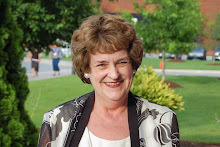

I have always loved flowers.
And I especially love the beautiful yard that I have now.
But in the last couple of years, I realize that my passion for flowers has taken on a new dimension. In the springtime, planting has been therapy. When I plant flowers, they stay put--unlike the appointments of the spring of the year which are always being adjusted and changed. Planting flowers is a beautiful habit to have -- giving me results which are tangible (something else that ministry doesn't always provide...especially on the District).
At the same time, I have learned that the beautiful flowers that were therapy and beauty in the springtime have to be watered in the heat of the summer. The hotter the temperature, the more water is needed. And it doesn't matter how beautiful the flat of annuals was in April or May, if I don't keep watering and feeding the plants in June, July and August, they are going to die. No plant can make it without water in these withering temperatures.
I am learning to pray as I water because I think that people are like my flowers. No matter how beautiful or well rooted, people need constant feeding, constant nourishment, constant inspiration if they are going to continue to flourish. We make a terrible mistake to look at our church members, leaders or visitors and see their dressed-up exterior and think they, in their polished appearance, can go for long without continual, significant nourishment.
While in the course of the seasons, this brutal hot weather is generally confined to the summer months, we are living in a culture that is heavy-laden with the stifling heat of criticism, despair, disillusionment and anger. We've got to water and water and water and water if we want our Christian members, family and friends to be beautiful in an atmosphere like this. Water when we feel like it and water when we are weary. Water when the weather is pleasant and especially water when temperatures are scortching hot.
As Paul wrote to the Galatians, let us not be weary in doing right. We will reap at harvest time if we do not lose heart. "So then, whenever we have an opportunity, let us work for the good of all, especially for those of the family of faith." (Galatians 6:9-10)




